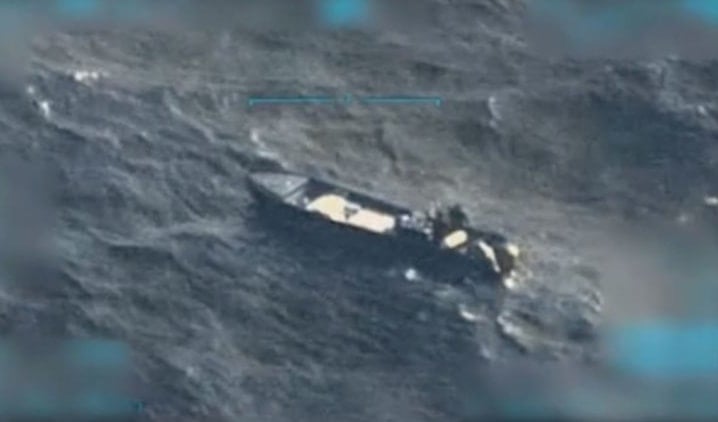Inside Rubio's push for government change in Venezuela: Drop Site
An investigation by Drop Site reveals that US intelligence contradicts Trump administration claims linking Venezuela to fentanyl trafficking, exposing how Washington’s narcotics narrative serves as a pretext for military escalation, regime change, and control over Venezuela’s oil and regional influence.
-

This screengrab of a video posted to US President Donald Trump’s Truth Social account on September 15, 2025, shows a boat on which Trump said he ordered a military strike, alleging narcotics were on it. He did not provide evidence to substantiate the claim. (Donald Trump/Truth Social)
Despite repeated allegations from the Trump administration, US intelligence assessments indicate that little to no fentanyl trafficked into the United States originates in Venezuela, according to a senior US official with direct knowledge of the matter cited by a Drop Site News investigation.
The official noted that many of the vessels targeted by US military strikes do not have the fuel capacity or motor strength to reach US waters, undermining statements by Secretary of War Pete Hegseth. These findings were echoed by Senator Rand Paul, who recently stated that "zero fentanyl is produced in Venezuela."
According to the report, the Trump administration continues to use claims of drug trafficking as a justification to escalate pressure on the government of President Nicolás Maduro. At a recent press conference, Trump claimed, “The land is going to be next,” suggesting a potential shift from maritime to land-based operations without congressional authorization. The US has since deployed an aircraft carrier to Latin America, raising concerns of military escalation.
According to sources familiar with internal White House discussions, Secretary of State Marco Rubio has played a central role in steering the administration’s Venezuela policy, moving from human rights and election concerns to a hardline narrative centered on narcoterrorism.
Rubio’s argument, built on a 2020 Department of Justice indictment accusing Maduro of cocaine trafficking, reportedly resonated with Trump, who had long pledged to take military action against drug cartels. With pressure mounting around Mexico-related operations, Rubio redirected the administration’s focus to Venezuela, bolstered by strategic interest in the country’s vast oil reserves.
According to Drop Site, though Maduro recently offered to turn over Venezuela’s oil to the US in exchange for halting hostilities, Trump, swayed by Rubio, rejected the proposal. Sources say the administration believes government change would allow for a more favorable agreement with a new government.
Military contracts and USAID funds flow into Colombia
The administration’s aggressive posture is also reflected in a surge of military and USAID-related funding to Colombia, a longstanding base of anti-Maduro activity. Recent public records show contracts for riverine combat boats, a virtual shooting range, and mineral advisory work in the region.
According to Drop Site, the State Department's law enforcement arm awarded a $4.8 million contract to VirTra Inc. in late September for a Colombian training platform. Additional contracts included $3.8 million for eight heavy combat boats and a separate deal for 21-foot patrol vessels. Deloitte also received a $3 million State Department contract for energy services in Colombia. However, the US strategy may face headwinds as Colombian President Gustavo Petro recently condemned a US airstrike that killed fishermen in Colombian waters.
Beyond the US-Venezuela drug trafficking claims, analysts point to energy geopolitics as a key motivator behind Washington’s actions. Moreover, Drop Site mentioned that Venezuela exports nearly half a million barrels of oil per day to China, far below capacity, raising speculation that access to Venezuelan oil is central to Washington’s strategy.
Tensions have also deepened with neighboring Guyana, where ExxonMobil recently announced a $6.8 billion expansion in the disputed Essequibo region. Venezuela’s Vice President, Delcy Rodríguez, accused Exxon of funding aggression in the area, calling Guyana a launchpad for US intervention. Meanwhile, Chevron, a major US oil player with longstanding ties to Venezuela, remains operational in the country, producing nearly a quarter of its oil output, according to the report.
The CIA and USAID have long operated in the region under the umbrella of "democracy promotion." Leaked documents from 2006 detail a five-point USAID strategy to undermine then-President Hugo Chávez through institutional penetration, division, and international isolation.
The report mentioned that organizations like the National Endowment for Democracy (NED) have funded media and civil society campaigns while maintaining a façade of independence. Also, Colombian outlet Connectas, a recipient of NED and State Department funds, has spearheaded investigative and social media campaigns targeting Maduro.
Public contracting records also reveal long-term information warfare operations, including a $458,915 “Guyana Ghost Men assessment” conducted by Madison Springfield Inc. for the US Army Special Operations. The company was later acquired by Culmen International, which also absorbed Premise Data, a contractor tied to pre-coup intelligence gathering in Venezuela.
A familiar pattern of intervention
Recent USAID policy changes now conceal the identities of recipients operating in high-risk areas like Venezuela, further obscuring the scope of Washington’s covert political actions.
While Trump’s current administration scaled back many of USAID’s political action programs in its early months, funding tied to anti-communist agendas, particularly in Cuba and Venezuela, remains active. Documents leaked to the media show that prior to cuts, a $6.2 million program aimed at transitioning Venezuela’s food distribution system from state-controlled to market-based was terminated.
The report stated that as the US pursues its confrontational posture, officials and experts alike question the credibility of its drug trafficking narrative. Despite the absence of evidence tying Venezuela to fentanyl production, the administration continues to cite narcotics as a pretext for military buildup, while pursuing government change efforts and deeper involvement in Latin America’s energy and political landscape.

 5 Min Read
5 Min Read








